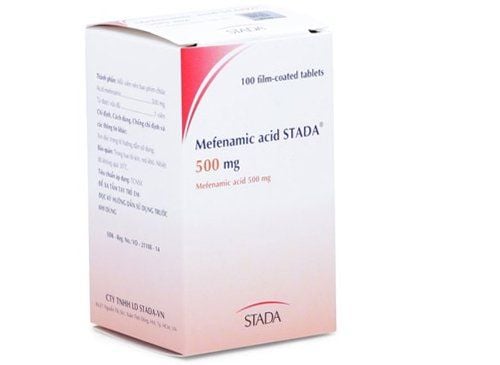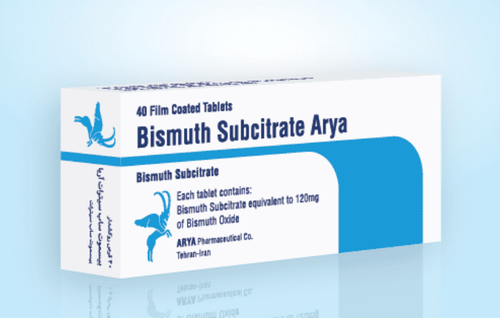This is an automatically translated article.
Mefenamic Acid is known as a non-steroidal anti-inflammatory drug (NSAID). The dose of Mefenamic Acid is based on your medical condition and response to therapy. Therefore, you need to follow your doctor's instructions when using the drug.
1. What are the effects of Mefenamic?
Mefenamic Acid is a prescription medication used for the short-term treatment of mild to moderate pain caused by various conditions. Mefenamic Acid is known as a non-steroidal anti-inflammatory drug (NSAID).2. How to use Mefenamic Acid?
How to use Mefenamic Acid as follows:
Take this medication by mouth 4 times a day or as directed by your doctor. After taking the medicine, you should sit and rest for about 10 minutes before going to bed. If you have an upset stomach, take the medicine with food or milk. Do not take mefenamic with antacids unless directed by your doctor. Some antacids can change how much mefenamic the body absorbs. The dose of Mefenamic Acid is based on your medical condition and response to therapy. To reduce the risk of stomach bleeding and other side effects, take this medicine at the lowest effective dose for the shortest time. Do not increase your dose, take it more often, or for a longer time than prescribed. This medicine should not normally be taken for more than 7 days at a time. If you are taking Mefenamic Acid on an "as-needed" basis then remember that pain relievers work best if they are taken at the first sign of pain. If you are using this medicine for painful periods, take your first dose as soon as your period or pain starts. Usually, you will only need to take the pill for the first 2-3 days of your period. Notify your doctor if your pain persists, worsens, or develops new symptoms.

Dùng thuốc Mefenamic Acid theo chỉ dẫn của bác sĩ để đạt hiệu quả tốt nhất.
3. Mefenamic Acid side effects
Possible side effects of Mefenamic Acid include:
Abdominal discomfort, nausea, heartburn, dizziness, drowsiness, diarrhea and headache. Mefenamic Acid can increase blood pressure, so you should check your blood pressure regularly and let your doctor know if the results are high. Tell your doctor right away if any of the following side effects occur: Fainting, severe headache, hearing changes, heart palpitations, mental and vision changes, stomach upset, symptoms of heart failure. Stop taking Mefenamic Acid and tell your doctor if any of the following rare but very serious side effects occur: Easy bruising, bleeding, signs of infection, unexplained stiff neck, change in numbers color quantity of urine. Mefenamic Acid medicine rarely causes serious liver disease, but if you notice any of these side effects such as: Nausea, persistent vomiting, stomach pain, weakness, dark urine, yellowing of eyes, skin, get it. Stop taking the medicine and consult a doctor. If you notice any symptoms of a serious allergic reaction such as: Skin rash ; itching (especially of the face, tongue, throat); dizziness, difficulty breathing, notify your doctor.
4. Prevention of side effects when using Mefenamic Acid
To limit and prevent side effects of Mefenamic Acid, you should:
Before taking Mefenamic Acid, tell your doctor if you are allergic to its ingredients or to aspirin and other NSAIDs (ibuprofen, naproxen). ...). Consult your doctor if you have asthma due to aspirin sensitivity, history of worsening breathing accompanied by runny nose and stuffy nose after taking aspirin or other NSAIDs, severe kidney disease, recent heart surgery (CABG), heavy bleeding, stomach ulcer. Before using Mefenamic Acid, tell your doctor your medical history, especially of bleeding problems, blood clotting, blood disorders, high blood pressure, diabetes, heart disease, tumors in the nose, obesity, tobacco use, gastrointestinal and esophageal problems, stroke, swelling. Kidney problems can sometimes occur with the use of NSAIDs, including mefenamic acid. Those problems are more likely to happen if you are dehydrated, have heart failure, have kidney disease, are older, or take certain medications. Therefore, you should drink plenty of water and tell your doctor immediately if there is a change in the amount of urine. Smoking cigarettes every day while using Mefenamic Acid can increase the risk of stomach bleeding. Therefore, you should quit smoking and limit stimulant drinks when taking Mefenamic Acid. Limit your time in the sun. When going outside, use sunscreen and wear sun-protective clothing to avoid blisters. Tell your doctor right away if you experience a sunburn or blistering or redness on your skin. If you plan to or are pregnant, you should tell your doctor. This medicine can harm an unborn baby and cause problems with labor during normal delivery. Mefenamic Acid is not recommended for use between 20 weeks of pregnancy and delivery. If your doctor decides that you need to use Mefenamic Acid between 20 and 30 weeks of pregnancy, you should take the lowest effective dose for the short term. In particular, this medicine should not be used after 30 weeks of pregnancy.

Trước khi dùng Mefenamic Acid, hãy cho bác sĩ biết nếu bạn có bất kỳ tình trạng dị ứng nào.
5. What interactions can occur when taking Mefenamic Acid?
Some products that may interact with Mefenamic Acid include: Aliskiren; ACE inhibitors (captopril, lisinopril); angiotensin II receptor blockers (valsartan, losartan); cidofovir; corticosteroids (prednisone); fluconazole; ketorolac; lithium; methotrexate; water pills (furosemide).
Mefenamic Acid may also increase the risk of bleeding when taken with other medicines. Examples include the antiplatelet drug clopidogrel; blood thinners dabigatran, enoxaparin, warfarin...
In particular, it is necessary to carefully check all information, because many drugs contain analgesic and antipyretic ingredients. These medicines are similar to Mefenamic Acid, which can increase the risk of side effects if taken together. However, if your doctor has directed you to take low-dose aspirin to prevent heart attack or stroke (usually at doses of 81-325 milligrams per day), you should continue taking it.
6. Some things to note when using Mefenamic Acid medicine
If overdose and serious symptoms such as: fainting, severe stomach pain, vomit that looks like coffee grounds, extreme drowsiness, slow breathing, convulsions, the patient should be taken to the body. nearest health facility. It is necessary to perform tests such as blood pressure, complete blood count, liver and kidney function... at regular times when using Mefenamic Acid. Mefenamic Acid may affect the results of some tests, so tell your healthcare provider or doctor. If you are taking Mefenamic Acid on a regular schedule and miss a dose, take it as soon as you remember. Store Mefenamic Acid at a temperature of 20-25 degrees Celsius, avoid a lot of light and high humidity, keep the medicine out of the reach of small children. In summary, Mefenamic Acid is a prescription medication used for the short-term treatment of mild to moderate pain caused by various conditions. In order for the drug to work effectively and limit the possible side effects, the patient should use it as prescribed by the doctor.
Please dial HOTLINE for more information or register for an appointment HERE. Download MyVinmec app to make appointments faster and to manage your bookings easily.
Reference source: Webmd.com












